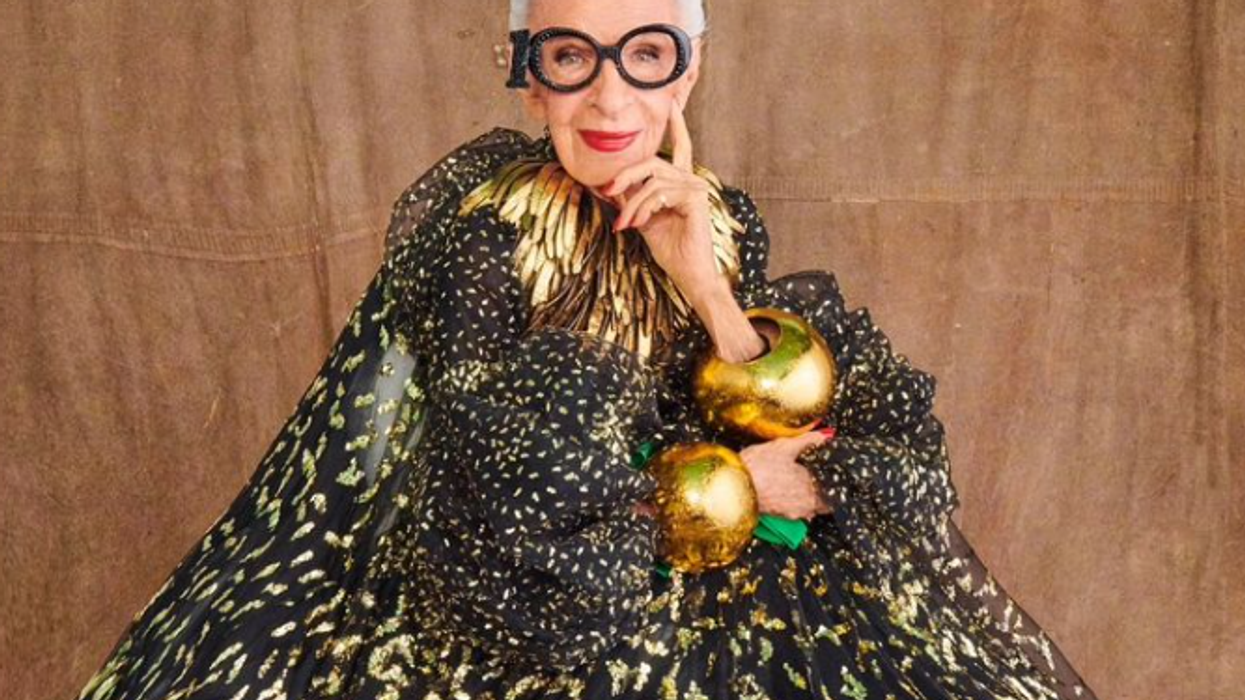Renowned for her eclectic style and infectious personality, Iris Apfel, the fashion maven, has passed away at the age of 102 in her Palm Beach home in Florida.
The news was confirmed by Stu Loeser, a spokesperson for her estate, marking the end of a remarkable life that spanned fashion, textile design, and cultural influence.
Apfel's late-in-life fame surged on social media platforms, where she gathered nearly 3 million Instagram followers and 215,000 TikTok fans. Her mantra, "More is more & Less is a Bore," echoed her distinctive approach to fashion.
Born Iris Barrel on August 29, 1921, in Queens, New York, to Russian mother Sadye, a boutique owner, and American father Samuel, whose family specialized in glass and mirrors, Apfel's early life was shaped by a mother who delved into the fashion boutique business. The self-proclaimed "accidental icon" embarked on a career that transcended traditional boundaries, leaving an indelible mark on the fashion landscape.
An expert in textiles and antique fabrics, Iris Apfel, alongside her husband Carl, owned the textile manufacturing company Old World Weavers. They specialized in restoration projects, contributing their expertise to the White House under six US presidents and catering to celebrity clients like Estee Lauder and Greta Garbo.
The turning point came in 2005 when the Metropolitan Museum of Art's Costume Institute showcased 40 pieces from Iris Apfel's collection in an exhibition titled "Rara Avis: The Irreverent Iris Apfel." This exhibition catapulted her into public consciousness, earning her monikers like the "First Lady of Fabric" and "Our Lady of the Cloth." Apfel's eccentric, high-low fashion sense, blending flea market finds with haute couture, became a cultural phenomenon.
Her magnetic presence, adorned in outlandish outfits, ice blue eyeshadow, ruby red lips, and trademark saucer-sized spectacles, became a regular sight at runway shows and magazine covers. Despite her late entry into modeling, Apfel secured a contract with IMG at the age of 97, defying conventional norms and becoming a cover girl in her nineties.
Iris Apfel's philanthropy extended to museums, with the Peabody Essex Museum in Salem, Massachusetts, receiving a substantial donation of her collection, including couture gowns. The Museum of Fashion & Lifestyle in Palm Beach plans a dedicated gallery to showcase items from her collection.
Her influence extended beyond fashion into various realms, from teaching at the University of Texas to collaborating with MAC Cosmetics and presenting a CFDA Award to designer Alexander Wang. Apfel's charisma and candidness endeared her to audiences, making her an accidental cultural icon.

Apfel's later years saw her collaborating with various brands, appearing in ads for M.A.C. cosmetics, Kate Spade, and designing lines for Home Shopping Network, H&M, Ciaté London, Zenni, and Ruggable.
In the documentary "Iris" (2014), directed by Albert Maysles, Apfel declared her love for the bold and extravagant: "I like big and bold and a lot of pizzazz." The film captured her traversing Harlem, haggling for bargains, and expressing her disdain for modern designers who, in her view, lacked the craftsmanship of sewing and draping.
Her favourite contemporary designers included Ralph Rucci, Isabel Toledo, and Naeem Khan. In a 2017 interview at age 95, Apfel emphasized individuality over trends, encouraging everyone to find their unique style. She dubbed herself the "accidental icon," a title that adorned her 2018 book filled with mementoes and style musings.
Apfel's impact was not confined to the fashion world; she symbolized an enduring spirit, continually adapting and embracing life's opportunities. In 2018, she modelled for Vogue, and a Barbie doll in her likeness was created by Mattel. Her resilience and work ethic were evident throughout her career, and even in her later years, she remained a workaholic, expressing gratitude for the unexpected acclaim.
Apfel's impact transcended fashion, with her likeness gracing a Barbie, and various tributes such as T-shirts, glasses, artwork, and dolls immortalizing her legacy.
As a visionary who saw fashion as an art form deeply intertwined with the socio-political context, Apfel's influence will resonate for generations. Her legacy is not merely a collection of clothes but a testament to the power of individuality and the timeless appeal of embracing one's unique style. In the words of The New Yorker, "The essence of Apfel’s art, like that of many of the greatest filmmakers, is the art of montage."




